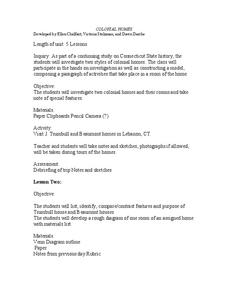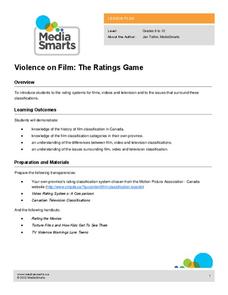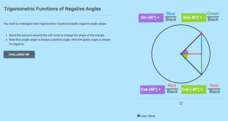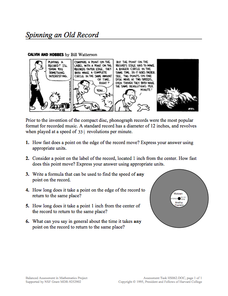Curated OER
Colonial Homes
Students tour colonial homes in Connecticut and compare their features. In this colonial homes lesson, students create a diorama after returning from a field trip to homes. Students use their observations and comparisons to complete the...
Curated OER
Grammatical Analogies
In this analogies worksheet, students choose the appropriate word out of a choice of four to complete each of the seven grammatical analogies listed.
Curated OER
Analogies
In this analogies worksheet, students complete seven analogies by choosing and writing the best word out of a choice of four to fill in each blank.
Curated OER
Analogies
In this analogies worksheet, students analyze seven analogies and complete each one by choosing the best multiple choice answer to finalize each one.
Think Like A Programmer! Puzzlets Cork the Volcano Curriculum
Common Core Standards Connected
The standards listed below are standards from the Common Core Framework which map to learning opportunities with Cork The Volcano & Puzzlets.
Source Link: http://www.corestandards.org/
Grade...
Curated OER
Antonym Comparison of Animals and Me
Young scholars explore the purpose of antonyms. In this language arts lesson, students create a list of words to describe animals. Young scholars use the list to generate antonyms for each descriptive word.
Curated OER
Spreadsheet Moon Comparison
Students use the Internet to research characteristics of moons for other planets They use a spreadsheet to organize information for all of the moons researched. They use the spreadsheet data to make statements showing comparisons and...
Curated OER
Comparison of King Lear and King James
Students learn of the comparisons between Shakespeare's play, King Lear, and the actual King James. They make historical connections through internet research.
Curated OER
Describing the Planets
Kids love learning about space! In this short plan, your young Spanish speakers read Los Planetas and talk about the nine planets. By the end, they should be able to name and identify each of the planets and add some descriptive words....
Howard Hughes Medical Institute
Biodiversity and Evolutionary Trees
Compare what shells look like on the outside with what makes that happen on the inside. Scholars begin by sorting an various seashells by their physical characteristics into phylogenetic trees. They then conduct a DNA comparison of...
Curated OER
Rates of Puberty Change: Lesson 2
The class fills in a handout - How Appearances Change During Puberty. They then discuss the changes that both boys and girls go through and make some comparisons of the differences between boys and girls . Hopefully this class is a safe...
Media Smarts
Violence on Film: The Ratings Game
Learn about film and TV ratings systems in Canada (includes a comparison to the MPAA system) and how they influence appropriate viewing for youths. A detailed commentary about the film Seven pointed at revealing flaws in ratings systems...
Illustrative Mathematics
Mr. Brigg's Class Likes Math
A quick discussion question that brings some collaboration into your classroom will allow your thinkers to make a decision about sampling. Mr. Briggs wants to know if the results from his class are a valuable comparison to the entire...
Indian Land Tenure Foundation
A Sense of Belonging
In order to understand how the land changes over time because of the people who live there, learners interview an elderly person about the past. Children ask an older family member to describe what the local area was like when they were...
National Science Teachers Association
Hop into Action
Young scientists find out what makes amphibians such unique and interesting animals in this simple life science activity. After looking at pictures and discussing the characteristics of amphibians, learners complete a series of three...
Balanced Assessment
Ostrich and Seahorse
Examine the relationship between ratios and scale. Young math scholars compare ratios of two models. They use the ratios to make a comparison between the two models. Each image uses a different scale, which requires learners to think...
LABScI
Cell Diffusion and Permeability: The See-Thru Egg Lab
Create a model to study a microscopic phenomenon. The seventh of 12 lessons uses an egg (without its shell) to represent a cell membrane. Using different solutions, learners explore the concept of cell diffusion. They monitor...
LABScI
Electrolysis: Splitting Water
Explore the chemical components of water through an electrolysis reaction. Scholars use a battery to divide various water solutions into different gases. As they collect the gases, they measure the volume and make a comparison to the...
CK-12 Foundation
Trigonometric Functions of Negative Angles
When is the trigonometric value of a negative angle the same as the positive angle? Pupils compare the values of trigonometric functions for different angles and their negatives. The interactive resource provides a visual display to make...
Concord Consortium
Spinning an Old Record
Take a trip back in time to examine angular velocity. Using the revolutions per minute, learners calculate the speed of a point on a 33 record. They compare the speed of a point on the edge of the record to the speed of a point closer to...
EngageNY
Analyzing the Significance of the Novel’s Title: Connecting the Universal Refugee Experience to Inside Out and Back Again, Part 3
What does it mean to mourn something? Scholars continue reading paragraph four from "Refugee and Immigrant Children: A Comparison" to better understand the mourning process for refugee children. Working with a partner, pupils then read...
Children’s Hospital of Philadelphia
The Innate Immune System
My body is my castle. Pupils learn about the innate immune system in the second lesson plan of a three-part unit on the immune system by comparing the innate immune system to a castle and moat. Groups conduct a simulation where they try...
K20 LEARN
Comparing Numbers And Fruit—More Or Less: Comparing Numbers
A discussion begins a lesson on comparing numbers. Pupils explain how they can show a number, then visit math centers to explore number-making tools. A story read-aloud of More or Less by Stuart Murphy identifies language for comparing...

























